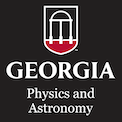Events Calendar View
-
Mathematical Physics Seminar
Jan 28, 2014
cancelled due to weather
-
Mathematical Physics Seminar
Feb 4, 2014
Newtonian gravity as space-time geometry
-
Departmental Colloquium
Feb 6, 2014
Quantum fine-structure of the Black Hole central singularity
I review the curious reasoning that carried me through the outer Schwarzschild singularity and present my current attempt to resolve the inner one. Both are based on quantum theory.
-
Mathematical Physics Seminar
Feb 11, 2014
cancelled due to weather
-
Mathematical Physics Seminar
Feb 18, 2014
Newtonian gravity as space-time geometry
-
Departmental Colloquium
Feb 20, 2014
Computational tools for physics education
While computer use has revolutionized our lives and physics research, the extent of a "Computer Revolution" in physics education is much less clear. One may ask if computers have really made a difference to physics education over and above convenient administration and dissemination and testing of information. None of the latter is trivial, but it is somewhat obvious and common to all disciplines.
- can computer use make a substantial difference in presentation of concepts?
- do younger faculty use more computer based examples?
- should and can computers replace hands on demonstrations and experiments? - what can realistically be accomplished?
All physicist have opinions on these issues and during my talk I will describe some approaches of others and present examples from areas such as modern/quantum physics and condensed matter where computational tools can greatly benefit student comprehension.
Thursday February 20, 2014
Listeners are welcome to bring smartphones or tablets, (resisting the temptation to email or check the news) so they can experience some interactive websites in the last part of the talk.
Page 51 of 121, showing 6 records out of 723 total, starting on record 301, ending on 306


